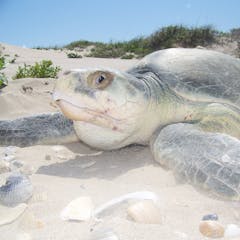
Articles on Fishing
Displaying 81 - 100 of 237 articles

The ocean moderates climate change by absorbing CO₂ emissions, hosts valuable biodiversity and provides food to millions, but all of these services are threatened by pollution and human activities.

For the endangered Kemp’s ridley sea turtle, every individual matters. A team of veterinarians and biologists has formed a network along the Gulf Coast to save injured sea turtles and the species.

Tackling bycatch in large-scale fishing can make our seafood habit more sustainable

The symbolic importance of fishing has politicised a rather technical dispute about licensing requirements.

A novel approach to fisheries management would see fishers taking control of their own catches.

Around 75% of fishermen in the Outer Hebrides speak Gaelic. Their daily use of the language at work helps keep it alive.

Supply chain transparency is important, but countries like Australia also must do more to support the justice process, such as securing compensation for fishermen and putting traffickers in jail.

A high seas treaty could help rebuild populations – but time is running out.

Agreements between the EU and its partner countries for fishing rights could be a great vehicle to push sustainability but more must be done before we can say they are doing that.

When illegal fishing is misrepresented, it leads to poor investments and misguided policies that don’t help the actual problem.

Forced labor is a widespread problem in fisheries on the high seas. Between 2012 and 2018, an estimated 100,000 people may have been victims of forced labor on thousands of different boats.

Decision-makers, locally and globally, must balance management of pandemics with a recognition that fish and fishing communities are essential to local well being.

Working waterfronts are a key link between consumers and seafood, but are increasingly threatened by developers. Policies need to ensure that waterfronts remain accessible to seafood harvesters.

The Atlantic Ocean is still growing physically, but humans are over-harvesting its rich fisheries. The most famous one – North Atlantic cod – has become a textbook example of harmful overfishing.

The Pacific Ocean produces oxygen, helps regulates the weather, provides food and livelihoods. It’s a place of fun, solace and spiritual connection. But its delicate ecology is under threat.

Scientists had been uncertain about why killer whales are dying in the northeastern Pacific Ocean. A new study takes an in-depth look and provides the tools to help prevent additional deaths in the future.

One in six fishers in the Gulf of Thailand have been coerced or deceived into working against their will.

The Blue Belt is a network of marine protected areas 17 times larger than the UK.

For 200 years, a small number of countries have exploited the marine wildlife of Antarctica, often with devastating impact on their populations.

Most existing MPAs are in distant and largely empty waters. Expanding them where it counts will meet a lot of resistance.
